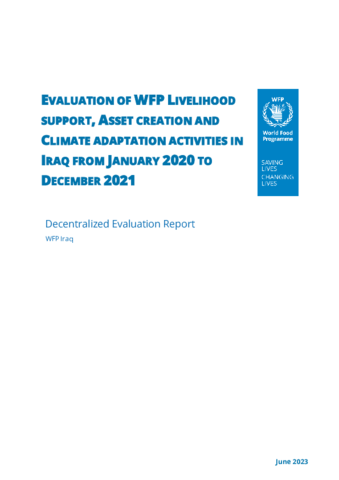
The evaluation was commissioned to inform WFP Iraq CSP operationalization and the design and implementation of resilience-building activities. It focused on assessing the relevance, relevance-gender, coverage, coherence, effectiveness, efficiency, sustainability and connectedness of the Livelihood Support, Asset Creation and Climate Adaptation Activities in Iraq. Overarching evaluation questions aimed to evaluate the appropriateness of the intervention design, its alignment with stakeholders and WFP’s plan, policies, and interventions, assessment of both intended and unintended outcomes, efficiency, and the sustainability of the benefits generated by the intervention.
The evaluation covered the following activities a) Food Assistance for Assets b) Emergency Cash for Work c) Urban Livelihoods d) Empowerment in Action.
Key evaluation findings included:
- WFP’s three-pronged approach to resilience programming incorporating contextual analysis, seasonal livelihood planning, and community-based participatory planning (CBPP) has not been consistently applied
- District-level prioritization by the WFP CO is based on robust analysis.
- The four intervention types are largely relevant, addressing short and, to some extent, medium/long-term needs of the different categories of beneficiary supported by WFP.
- Gender sensitivity and other cross-cutting considerations have not been consistently incorporated into programme design and implementation.
- Overall, programmatic output levels have been achieved for most interventions, with activities generally starting and finishing on time.
Key recommendations from the evaluation included
- CO should enforce the three-pronged approach in the new programme interventions, improving community participation throughout project implementation.
- The resilience team management should ensure consistent application of selection criteria at the field level whether working with CPs, public authorities, or directly implementing activities.
- To enhance sustainability, it is essential to incorporate follow-up and sustainability activities into ongoing and future resilience interventions.
- WFP country team should increase the staff dedicated to gender and other cross-cutting areas.
